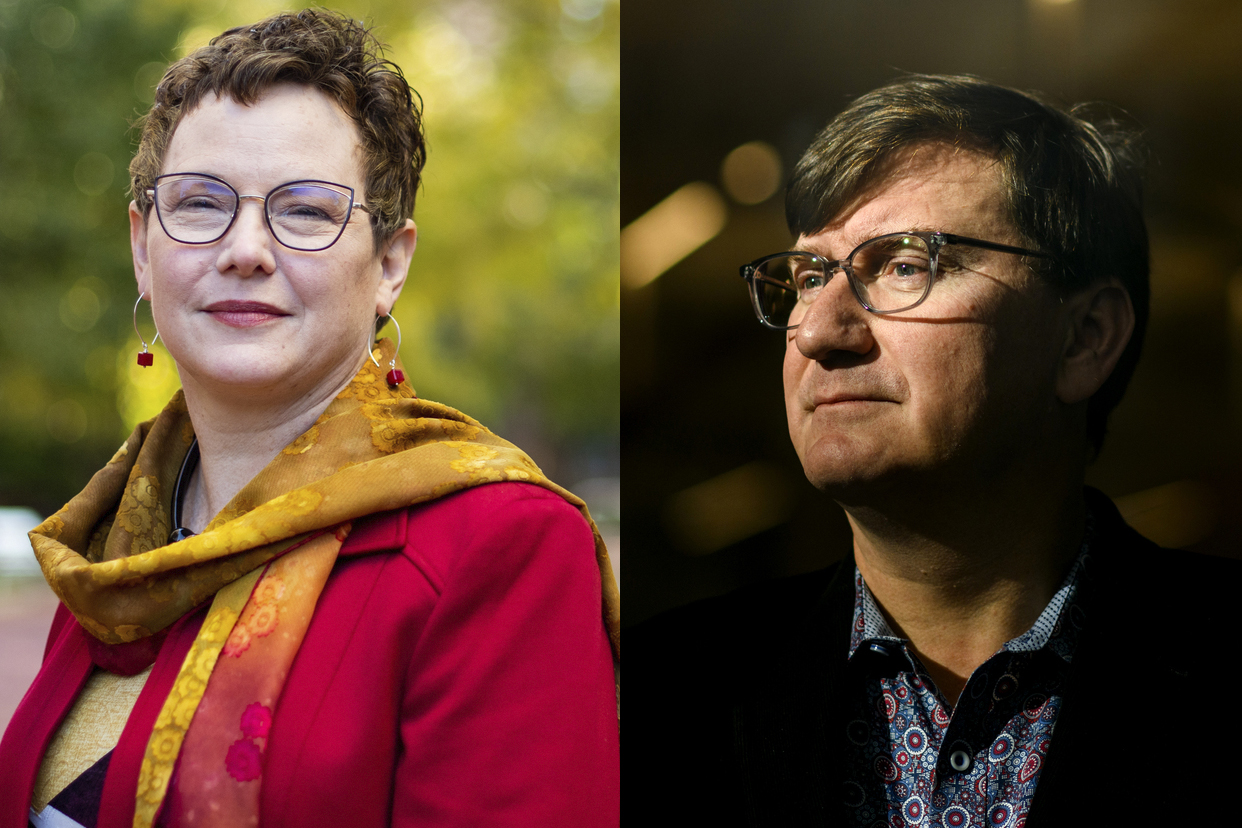Despite current slump of tech giants, strong growth seen in computer science job market for Khoury students

As the biggest tech companies showed slower growth in the third quarter of 2022 and the giants like Meta, Amazon and Twitter laid off thousands of employees, the air and the internet filled up with anxiety over a possibly shrinking tech job market.

But media outlets downplayed the U.S. Bureau of Labor Statistics projections that the overall employment in computer and information technology occupations is projected to grow 15% from 2021 to 2031, says Elizabeth Mynatt, dean of Northeastern’s Khoury College of Computer Sciences, which is much faster than the average growth rate across all industries.
The number of jobs for professions like computer and information research scientists, information security analysts and web developers and digital designers is expected to expand by more than 20%.
Khoury College, created at Northeastern in 1982 as one of the first colleges dedicated to the field of computer science in the U.S., has remained a national leader in computer science education and research due to its innovative approach, involving experiential education through co-ops and combined interdisciplinary majors.
About 4,000 undergraduate and 3,500 graduate students currently attend the college across multiple campuses on the East and the West coasts in the U.S., in Vancouver, Canada, and online.
Undergraduate degree programs at the college range from computer science to cybersecurity to data science, but a strong majority—58% of students—choose one of the more than 40 combined majors. Last year, combined majors almost surpassed co-ops as the top reason why incoming students chose Khoury College, says Benjamin Hescott, senior associate dean of academic programs and student experience.
News@Northeastern sat down with Mynatt and Hescott to discuss the state of the hiring market for computer science majors and how the college keeps up with the industry and prepares its students for career success.
Are you concerned that the computer science job market will possibly contract due to the current state of the economy and recent layoffs, hiring freezes and planned recruiting slowdowns at the largest tech companies?
Mynatt: When we started seeing the news as well, the first thing I did was call Ben to ask, ‘What are we seeing in our co-ops? What are we seeing in our placements?’
But the reassuring news was ‘we are doing fine.’ The opportunities are there.
There have been a number of very high-profile layoffs and hiring freezes at the classic big tech—Amazon, Facebook, Google—but the market itself is going to continue to grow.
That growth continues to be seen in sectors such as health care, fintech, design, media, communications and agriculture. Pretty much any major sector in the U.S. economy is hiring more and more folks who can harness computational power for what they want to accomplish.
Compared to essentially all our competitors, Northeastern is in a much stronger position, because we have over 40 combined interdisciplinary majors and more are in the works. These combined majors integrate computer science, data science or cybersecurity with other disciplines, from business to design to biology or economics, and more. As a result, our students are incredibly well prepared for where the growth will be.
How does Khoury College monitor what is happening on the job market and in the industry to keep its programs relevant?
Mynatt: We are always hearing from our [existing] co-op employers or new co-op employers.
We have industry partners who can say, ‘Oh, do the students know X?’ or ‘Wouldn’t it be great if they knew Y?’ We are in constant conversations, and the students are in those conversations as well. There are no surprises come graduation about what they really need to be successful. There is constant business intelligence coming our way.
Hescott: About 50% of our students actually get jobs that are outside of the NUworks career portal and other databases. Khoury uses the Handshake platform quite extensively as well, and when our students initiate a relationship with an industry partner, we then develop the relationship from there on. So, students are feeding the pipeline with their interests.
Who are some of the partners that the co-op program at Khoury College has?
Hescott: We have everything from small startups to big companies. We’ve got an ongoing relationship with places like HubSpot and Wayfair. We are still placing students at Facebook and Amazon. Amazon is almost always one of our number one employers.
Mynatt: We see students going into fintech, into the health sector (with Kaiser being one of the major hiring health systems), into game design at the major studios.
The students are really savvy. They’ll use their two co-ops to look at both sides of their combined major. They may go and work in a pharmaceutical wet lab in their first co-op and then follow that with a software development position for pharmaceutical development. They really leverage that double co-op opportunity as a way to understand the breadth of what jobs in that sector could look like.
Do you help graduating students find their first job?
Hescott: About 85% of our students get return offers, meaning they go on a co-op and later get a full-time job offer from that employer. Our industry partners are hiring Northeastern students, they want Northeastern students.
Mynatt: We also work with the employers who want to hire more of our students, especially because of the diversity of our students. I’ve had meetings with Goldman Sachs and Amazon Web Services. They want even more of our students to be successful through that hiring process. And they have set up on-campus experiences and support, as well as coaching for the students so that they get more students in the pipeline to be considered for permanent employment.
Professor Mynatt, as a leader of the college, what is your philosophy about computer science education?
Mynatt: The mission [statement] for our college is ‘Computer science for everyone.’ The combined majors are one of the really important pieces for making that work. We describe that as accessible and actionable education. It is accessible in terms of making it appealing, making it relevant, fostering the sense of belonging, but also actionable— giving students the tools so that they will be successful in their careers.
I’m also working on making sure that our research aligns with this mission. How do we go the extra mile in our research efforts, so that everyone societally benefits from computer science innovation?
Computer science has a reputation of only being about the Googles and Facebooks, and Amazons of the world or only being about billionaires and the top 1% or the top 5%. And there’s so much more that we’re doing in our research that creates equitable outcomes, for example, for neurodiverse people; minority groups that are discriminated against on online platforms; or different patient populations in the health care system.
Less than a year ago, we launched the idea of a professional oath for our graduating students. It emphasizes the importance of social responsibility as part of becoming a computer scientist. And there was just such a tremendous positive response to this idea.
How does Northeastern’s global presence benefit your students?
Mynatt: When we bring in local context and local partners, students can better understand how computer science has an impact in the local community and the world.
For example, in Vancouver, we have a tremendous focus on First Nation and indigenous populations. We are able to come up with innovations that the computer scientists wouldn’t think of otherwise, that can be deeply meaningful for that community. It’s not until you dig past the surface that you discover new questions around sustainable agriculture and questions around education and language processing, for example.
At the Oakland campus, the focus is going to be much more about racial and social equity. I’m really excited that a number of our partners are actually going to be community groups.
In London, we have a particular focus around network science. That is because of where London sits as a European thought leader, requiring cutting edge tools for better understanding everything from global pandemics to economic fluctuations.
Those are three very different examples. But they provide real, tangible, meaningful challenges for our students to work on as part of their degree work and in their co-ops. And it makes all the difference in terms of the insights that they glean and the impact they will have in the world.
For media inquiries, please contact media@northeastern.edu.






